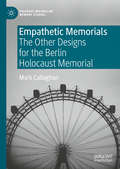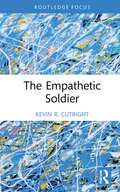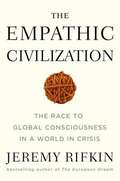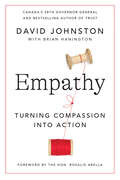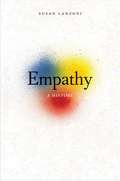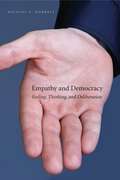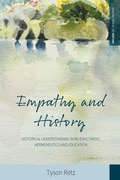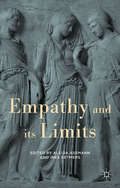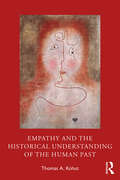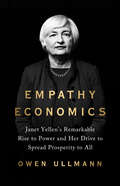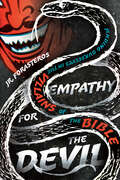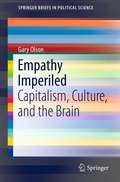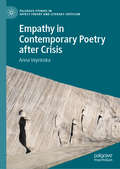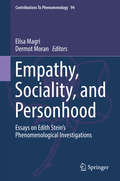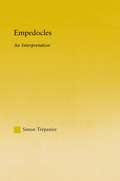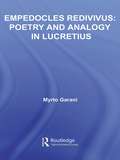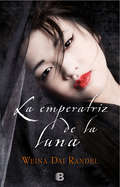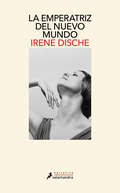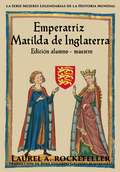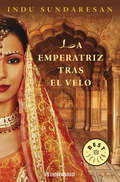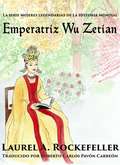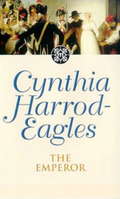- Table View
- List View
Empathetic Memorials: The Other Designs for the Berlin Holocaust Memorial (Palgrave Macmillan Memory Studies)
by Mark CallaghanThis book is a study of the Berlin Holocaust Memorial Competitions of the 1990s, with a focus on designs that kindle empathetic responses. Through analysis of provocative designs, the book engages with issues of empathy, secondary witnessing, and depictions of concentration camp iconography. It explores the relationship between empathy and cultural memory when representations of suffering are notably absent. The book submits that one design represents the idea of an uncanny memorial, and also pays attention to viewer co-authorship in counter-monuments. Analysis of counter-monuments also include their creative engagement with German history and their determination to defy fascist aesthetics. As the winning design for The Memorial to the Murdered Jews of Europe is abstract with an information centre, there is an exploration of the memorial museum. Callaghan asks whether this configuration is intended to compensate for the abstract memorial’s ambiguity or to complement the design’s visceral potential. Other debates explored concern political memory, national memory, and the controversy of dedicating the memorial exclusively to murdered Jews.
The Empathetic Soldier (War, Conflict and Ethics)
by Kevin R. CutrightThis book shows the contribution that empathy can and should make to the proper conduct of war. US Army doctrine identifies empathy as an essential trait in soldiers; despite this endorsement of senior leaders, empathy’s role in the military profession remains obscure. The notion of soldiers empathetically considering others, especially enemies, strikes many as counter to the nature of soldiering. Additionally, confusion caused by differing definitions of empathy often leads to its complete dismissal. This work clarifies the concept by considering recent philosophical, psychological, and neuroscientific research, and demonstrates the relevance of empathy to the tactical and strategic demands of war. Empathy amplifies soldiers’ understanding of human actors in an operational environment, enables soldiers’ critical and creative thinking, and improves their overall intentions, planning, and assessments of a war’s progress. While empathy can make soldiers more susceptible to the psychic wound of moral injury, it also helps prevent and overcome this injury. Instead of dismissing it, soldiers should assimilate empathy into their moral frameworks. This book will be of much interest to students of the ethics of war, psychology, and military studies generally.
The Empathic Civilization: The Race to Global Consciousness in a World in Crisis
by Jeremy Rifkin"One of the leading big-picture thinkers of our day" (Utne Reader) delivers his boldest work in this erudite, tough-minded, and far-reaching manifesto. Never has the world seemed so completely united-in the form of communication, commerce, and culture-and so savagely torn apart-in the form of war, financial meltdown, global warming, and even the migration of diseases. No matter how much we put our minds to the task of meeting the challenges of a rapidly globalizing world, the human race seems to continually come up short, unable to muster the collective mental resources to truly "think globally and act locally." In his most ambitious book to date, bestselling social critic Jeremy Rifkin shows that this disconnect between our vision for the world and our ability to realize that vision lies in the current state of human consciousness. The very way our brains are structured disposes us to a way of feeling, thinking, and acting in the world that is no longer entirely relevant to the new environments we have created for ourselves. The human-made environment is rapidly morphing into a global space, yet our existing modes of consciousness are structured for earlier eras of history, which are just as quickly fading away. Humanity, Rifkin argues, finds itself on the cusp of its greatest experiment to date: refashioning human consciousness so that human beings can mutually live and flourish in the new globalizing society. In essence, this shift in consciousness is based upon reaching out to others. But to resist this change in human relations and modes of thinking, Rifkin contends, would spell ineptness and disaster in facing the new challenges around us. As the forces of globalization accelerate, deepen, and become ever more complex, the older faith-based and rational forms of consciousness are likely to become stressed, and even dangerous, as they attempt to navigate a world increasingly beyond their reach and control. Indeed, the emergence of this empathetic consciousness has implications for the future that will likely be as profound and far-reaching as when Enlightenment philosophers upended faith-based consciousness with the canon of reason.
The Empathic Civilization
by Jeremy RifkinIn this sweeping new interpretation of the history of civilization, bestselling author Jeremy Rifkin looks at the evolution of empathy and the profound ways that it has shaped our development-and is likely to determine our fate as a species. Today we face unparalleled challenges in an energy-intensive and interconnected world that will demand an unprecedented level of mutual understanding among diverse peoples and nations. Do we have the capacity and collective will to come together in a way that will enable us to cope with the great challenges of our time? In this remarkable book Jeremy Rifkin tells the dramatic story of the extension of human empathy from the rise of the first great theological civilizations, to the ideological age that dominated the 18th and 19th centuries, the psychological era that characterized much of the 20th century and the emerging dramaturgical period of the 21st century. The result is a new social tapestry-The Empathic Civilization-woven from a wide range of fields. Rifkin argues that at the very core of the human story is the paradoxical relationship between empathy and entropy. At various times in history new energy regimes have converged with new communication revolutions, creating ever more complex societies that heightened empathic sensitivity and expanded human consciousness. But these increasingly complicated milieus require extensive energy use and speed us toward resource depletion. The irony is that our growing empathic awareness has been made possible by an ever-greater consumption of the Earth's resources, resulting in a dramatic deterioration of the health of the planet. If we are to avert a catastrophic destruction of the Earth's ecosystems, the collapse of the global economy and the possible extinction of the human race, we will need to change human consciousness itself-and in less than a generation. Rifkin challenges us to address what may be the most important question facing humanity today: Can we achieve global empathy in time to avoid the collapse of civilization and save the planet? One of the most popular social thinkers of our time, Jeremy Rifkin is the bestselling author of The European Dream, The Hydrogen Economy¸ The End of Work, The Biotech Century, and The Age of Access. He is the president of the Foundation on Economic Trends in Washington, D. C.
Empathy: Turning Compassion into Action
by David JohnstonThe 28th Governor General's most personal and timely book to date: a passionate and practical guide for turning empathy into action.As the world stumbles through the most severe pandemic of the last century, threatened by teetering economies, torn by political division, separated by unequal access to resources, and wrestling with issues as diverse as racism, gender, cybercrime, and climate change, the nations that best adapt and prosper are those in which empathy is fully alive and widely active. Written for a post-pandemic world, Empathy is a book about learning to be empathetic and then turning that empathy into action. Based on the personal experiences of author David Johnston, the book explores how awakening to the transformative power of listening and caring permanently changes individuals, families, communities, and nations. A how-to manual for a world craving kindness, Empathy offers proof of the inherent goodness of people, and shows how exercising the instinct for kindness creates societies that are both smart and caring. Through poignant stories and crisp observations, David contends that &“Everyone has power over some things that other people don&’t. When they learn ways to turn that power into action, they change the future dramatically.&” With clear and practical focus, Empathy looks at a host of issues that demand our attention, from education and immigration, to healthcare, the law, policing, business ethics, and criminal justice. In each of these areas, Johnston highlights the deeper understandings that have arisen during the COVID-19 crisis, with sharp emphasis on the positive and negative lessons now in crisp focus. Convinced that empathy is the fastest route to peace and progress in all their forms, David ends each short chapter with a set of practical steps the reader can take to make the world better, one deliberate action at a time.
Empathy: A History
by Susan LanzoniA surprising, sweeping, and deeply researched history of empathy—from late-nineteenth-century German aesthetics to mirror neurons†‹Empathy: A History tells the fascinating and largely unknown story of the first appearance of “empathy” in 1908 and tracks its shifting meanings over the following century. Despite empathy’s ubiquity today, few realize that it began as a translation of Einfühlung or “in-feeling” in German psychological aesthetics that described how spectators projected their own feelings and movements into objects of art and nature. Remarkably, this early conception of empathy transformed into its opposite over the ensuing decades. Social scientists and clinical psychologists refashioned empathy to require the deliberate putting aside of one’s feelings to more accurately understand another’s. By the end of World War II, interpersonal empathy entered the mainstream, appearing in advice columns, popular radio and TV, and later in public forums on civil rights. Even as neuroscientists continue to map the brain correlates of empathy, its many dimensions still elude strict scientific description. This meticulously researched book uncovers empathy’s historical layers, offering a rich portrait of the tension between the reach of one’s own imagination and the realities of others’ experiences.
Empathy and Democracy: Feeling, Thinking, and Deliberation
by Michael E. MorrellDemocracy harbors within it fundamental tensions between the ideal of giving everyone equal consideration and the reality of having to make legitimate, binding collective decisions. Democracies have granted political rights to more groups of people, but formal rights have not always guaranteed equal consideration or democratic legitimacy. It is Michael Morrell’s argument in this book that empathy plays a crucial role in enabling democratic deliberation to function the way it should. Drawing on empirical studies of empathy, including his own, Morrell offers a “process model of empathy” that incorporates both affect and cognition. He shows how this model can help democratic theorists who emphasize the importance of deliberation answer their critics.
Empathy and History: Historical Understanding in Re-enactment, Hermeneutics and Education (Making Sense of History #35)
by Tyson RetzSince empathy first emerged as an object of inquiry within British history education in the early 1970s, teachers, scholars and policymakers have debated the concept’s role in the teaching and learning of history. Yet over the years this discussion has been confined to specialized education outlets, while empathy’s broader significance for history and philosophy has too often gone unnoticed. Empathy and History is the first comprehensive account of empathy’s place in the practice, teaching, and philosophy of history. Beginning with the concept’s roots in nineteenth-century German historicism, the book follows its historical development, transformation, and deployment while revealing its relevance for practitioners today.
Empathy and its Limits
by Aleida Assmann Ines DetmersThis volume extends the theoretical scope of the important concept of empathy by analysing not only the cultural contexts that foster the generating of empathy, but in focusing also on the limits of pro-social feelings and the mechanisms that lead to its blocking.
Empathy and the Historical Understanding of the Human Past
by Thomas A. KohutEmpathy and the Historical Understanding of the Human Past is a comprehensive consideration of the role of empathy in historical knowledge, informed by the literature on empathy in fields including history, psychoanalysis, psychology, neuroscience, philosophy, and sociology. The book seeks to raise the consciousness of historians about empathy, by introducing them to the history of the concept and to its status in fields outside of history. It also seeks to raise the self-consciousness of historians about their use of empathy to know and understand past people. Defining empathy as thinking and feeling, as imagining, one’s way inside the experience of others in order to know and understand them, Thomas A. Kohut distinguishes between the external and the empathic observational position, the position of the historical subject. He argues that historians need to be aware of their observational position, of when they are empathizing and when they are not. Indeed, Kohut advocates for the deliberate, self-reflective use of empathy as a legitimate and important mode of historical inquiry. Insightful, cogent, and interdisciplinary, the book will be essential for historians, students of history, and psychoanalysts, as well as those in other fields who seek to seek to know and understand human beings.
Empathy Economics: Janet Yellen's Remarkable Rise to Power and Her Drive to Spread Prosperity to All
by Owen UllmannNamed one of Investopedia's 7 Best Economics Books of 2022The trailblazing story of Janet Yellen, the Ruth Bader Ginsburg of economics, and her lifelong advocacy for an economics of empathy that delivers the fruits of a prosperous society to people at the bottom half of the economic ladder. When President Biden announced Janet Yellen as his choice for secretary of the treasury, it was the peak moment of a remarkable life. Not only the first woman in the more than two-century history of the office, Yellen is the first person to hold all three top economic policy jobs in the United States: chair of both the Federal Reserve and the President&’s Council of Economic Advisors as well as treasury secretary. Through Owen Ullmann&’s intimate portrait, we glean two remarkable aspects of Yellen&’s approach to economics: first, her commitment to putting those on the bottom half of the economic ladder at the center of economic policy, and employing forward-looking ideas to use the power of government to create a more prosperous, productive life for everyone. And second, her ability to maintain humanity in a Washington policy world where fierce political combat casts others as either friend or enemy, never more so than in our current age of polarization. As Ullmann takes us through Yellen&’s life and work, we clearly see her brilliance and meticulous preparation. What stands out, though, is Yellen as an icon of progress—the &“Ruth Bader Ginsburg of economics&”—a superb-yet-different kind of player in a cold, male-dominated profession that all too often devises policies to benefit the already well-to-do. With humility and compassion as her trademarks, we see the influence of Yellen&’s father, a physician whose pay-what-you-can philosophy meant never turning anyone away. That compassion, rooted in her family life in Brooklyn, now extends across our entire country.
Empathy for the Devil: Finding Ourselves in the Villains of the Bible
by Jr. ForasterosDo we have anything in common with the bad guys of the Bible? The sins of wrath, idolatry, and abuse of power are closer to us than we think. How do we guard against them? We learn not only by following moral exemplars—we also need to look at the warnings of lives gone wrong. In this fictionalized narrative, JR. Forasteros reintroduces us to some of the most villainous characters of Scripture. He shows us what we can learn from their negative examples, with figures such as Cain, Jezebel, King Herod, Sampson and Delilah, and even Satan serving as cautionary tales of sin and temptation. Forasteros vividly tells their stories to help us understand their motivations, and his astute biblical and cultural exposition points out what we often miss about their lives. We soon discover that we might have more in common with these characters than we would like to admit. Take a fresh look at the scoundrels of Scripture, and find sound pastoral guidance here to walk the path of righteousness.
Empathy Imperiled
by Gary OlsonThe most critical factor explaining the disjuncture between empathy's revolutionary potential and today's empathically-impaired society is the interaction between the brain and our dominant political culture. The evolutionary process has given rise to a hard-wired neural system in the primal brain and particularly in the human brain. This book argues that the crucial missing piece in this conversation is the failure to identify and explain the dynamic relationship between an empathy gap and the hegemonic influence of neoliberal capitalism, through the analysis of the college classroom, the neoliberal state, media, film and photo images, marketing of products, militarization, mass culture and government policy. This book will contribute to an empirically grounded dissent from capitalism's narrative about human nature. Empathy is putting oneself in another's emotional and cognitive shoes and then acting in a deliberate, appropriate manner. Perhaps counter-intuitively, it requires self-empathy because we're all products of an empathy-anesthetizing culture. The approach in this book affirms a scientific basis for acting with empathy, and it addresses how this can help inform us to our current political culture and process, and make its of interest to students and scholars in political science, psychology, and other social sciences.
Empathy in Contemporary Poetry after Crisis (Palgrave Studies in Affect Theory and Literary Criticism)
by Anna VeprinskaThis book examines the representation of empathy in contemporary poetry after crisis, specifically poetry after the Holocaust, the September 11, 2001 terrorist attacks, and Hurricane Katrina. The text argues that, recognizing both the possibilities and dangers of empathy, the poems under consideration variously invite and refuse empathy, thus displaying what Anna Veprinska terms empathetic dissonance. Veprinska proposes that empathetic dissonance reflects the texts’ struggle with the question of the value and possibility of empathy in the face of the crises to which these texts respond. Examining poems from Charlotte Delbo, Dionne Brand, Niyi Osundare, Charles Reznikoff, Robert Fitterman, Wisława Szymborska, Cynthia Hogue, Claudia Rankine, Paul Celan, Dan Pagis, Lucille Clifton, and Katie Ford, among others, Veprinska considers empathetic dissonance through language, witnessing, and theology. Merging comparative close readings with interdisciplinary theory from philosophy, psychology, cultural theory, history and literary theory, and trauma studies, this book juxtaposes a genocide, a terrorist act, and a natural disaster amplified by racial politics and human disregard in order to consider what happens to empathy in poetry after events at the limits of empathy.
Empathy, Sociality, and Personhood: Essays On Edith Stein's Phenomenological Investigations (Contributions To Phenomenology #94)
by Elisa Magrì Dermot MoranThis book explores the phenomenological investigations of Edith Stein by critically contextualising her role within the phenomenological movement and assessing her accounts of empathy, sociality, and personhood. Despite the growing interest that surrounds contemporary research on empathy, Edith Stein’s phenomenological investigations have been largely neglected due to a historical tradition that tends to consider her either as Husserl’s assistant or as a martyr. However, in her phenomenological research, Edith Stein pursued critically the relation between phenomenology and psychology, focusing on the relation between affectivity, subjectivity, and personhood. Alongside phenomenologists like Max Scheler, Kurt Stavenhagen, and Hedwig Conrad-Martius, Stein developed Husserl’s method, incorporating several original modifications that are relevant for philosophy, phenomenology, and ethics. Drawing on recent debates on empathy, emotions, and collective intentionality as well as on original inquiries and interpretations, the collection articulates and develops new perspectives regarding Edith Stein’s phenomenology. The volume includes an appraisal of Stein’s philosophical relation to Edmund Husserl and Max Scheler, and develops further the concepts of empathy, sociality, and personhood. These essays demonstrate the significance of Stein’s phenomenology for contemporary research on intentionality, emotions, and ethics. Gathering together contributions from young researchers and leading scholars in the fields of phenomenology, social ontology, and history of philosophy, this collection provides original views and critical discussions that will be of interest also for social philosophers and moral psychologists.
Empedocles: An Interpretation (Studies in Classics)
by Simon TrepanierOffers the first complete reinterpretation of Empedocles – one of the founding figures of Western philosophy – since the publication of the Strasbourg papyrus in 1999 brought new fragments of his lost work to light.
Empedocles Redivivus: Poetry and Analogy in Lucretius (Studies in Classics)
by Myrto GaraniDespite the general scholarly consensus about Lucretius’ debt to Empedocles as the father of the genre of cosmological didactic epic, there is a major disagreement regarding Lucretius’ applause for his Presocratic predecessor’s praeclara reperta (DRN 1.732). In the present study, Garani suggests that by praising Empedocles’ discoveries, Lucretius points to his predecessor’s epistemological methods of inquiry concerning the unseen, methods upon which he himself draws extensively and creatively enhances. In this way, he successfully penetrates into the invisible natural world, deciphers its secrets, and thus liberates his pupil from superstitious fears about death and physical phenomena. To justify this proposition, Garani undertakes a systematic analysis of Lucretius’ integration of Empedocles’ methods of creating analogies in the form of literary devices -- personifications, similes, and metaphors -- and demonstrates that his intertextual engagement with Empedocles’ philosophical poem is direct and intensive at both the poetic and the philosophical levels.
La emperatriz de la luna (Emperatriz Wu #Volumen 2)
by Weina Dai RandelEn esta continuación de El palacio de la luna Mei deberá luchar por el poder desde dentro de palacio y se verá obligada incluso a arriesgar su vida por convertirse en la única mujer que ha gobernado China. Cuando el amante de Mei es coronado emperador, la lucha por el poder estalla entre ella y la emperatriz Wang. Ambas están desesperadas por conservar su nombre y su posición. Cuando la emperatriz decide asesinar a los seguidores de Mei, la lucha entre ambas alcanza nuevas cotas: Mei se da cuenta de que debe vencer a la delirante emperatriz no solo para salvarse a sí misma, sino para proteger su país.
La emperatriz de la luna
by Weina Dai RandelEn esta continuación de El palacio de la luna Mei deberá lucha por el poder desde dentro de palacio y se verá obligada incluso a arriesgar su vida por convertirse en la única mujer que ha gobernado China. Cuando el amante de Mei es coronado emperador, la lucha por el poder estalla entre ella y la emperatriz Wang. Ambas están desesperadas por conservar su nombre y su posición. Cuando la emperatriz decide asesinar a los seguidores de Mei, la lucha entre ambas alcanza nuevas cotas: Mei se da cuenta de que debe vencer a la delirante emperatriz no solo para salvarse a sí misma, sino para proteger su país.
La emperatriz del nuevo mundo
by Irene DischeUna historia conmovedora sobre la relación entre una abuela, su hija y su nieta en la bulliciosa Nueva York de la posguerra. Elisabeth Rother, la emperatriz del nuevo mundo, ha decidido escribir sus memorias y no piensa morderse la lengua. Y para ello hace un recorrido por el clan de su familia alemana católico-judía afincada en Estados Unidos: su marido, un médico judío converso; su talentosa hija, Renate; su nieta, Irene Dische, pasando por capítulos enteros de la historia del siglo XX, desde el ascenso del nazismo en Alemania hasta su exilio forzoso en Nueva York. Pero en el centro de sus preocupaciones está la rebeldía de Renate e Irene. La emperatriz del nuevo mundo es tanto un singular relato sobre la inmigración y la vida en Nueva York de toda una generación que tuvo que huir de sus países por culpa del nazismo, como una carta de amor conmovedora sobre la relación entre abuelas, madres e hijas. La crítica ha dicho:«Increíblemente ingenioso, escrito de un modo precioso, La emperatriz del nuevo mundo es un potente guiso de clase, sexo y religión, además de choques culturales y generacionales. Dische recrea a una magnífica misántropa en la versión novelada de su abuela.»The Star-Ledger «Brillante, desconcertantemente divertida, la narradora es todo lo cautivadora que un lector podría desear. Una exploración maravillosa del honor y la identidad, la codicia, el sacrificio y las disputas. Al igual que los ritmos de staccato de Dische y las frases inexpresivas se extienden hasta alcanzar el lirismo, también lo que parece crudo, incluso cínico, se convierte en un amor nada sentimental, profundamente gratificante (y a veces temible).»Newsday «No puede decirse que los narradores egocéntricos e insufribles sean extraños para la ficción contemporánea, pero ayuda si son tan divertidos como grandilocuentes. [...] La voz de la emperatriz réproba es perfecta. [...] Dische ha recreado a su abuela novelada con habilidad y gracia.»The Boston Globe «Un viaje vívido y divertidísimo. [...] Lo verdaderamente elevado de La emperatriz del nuevo mundo yace en la voz de la narradora. Clara como el agua, con una inequívoca personalidad propia, Frau Rother se retrata con la precisión del escalpelo de un cirujano. Y eso es lo que hace la autora aquí, llevar a cabo la autopsia de los personajes de su familia.»Los Angeles Times
Emperatriz Matilda de Inglaterra
by Laurel A. Rockefeller¡La leona rugiente de Inglaterra! Nacida en 1102 del rey Enrique I de Inglaterra y la reina Matilda de Escocia, la herencia real única de Matilda, normanda, sajona y escocesa fue destinada a unificar a una Inglaterra todavía dividida por las conquistas de su abuelo en 1066. Cuando en 1120, el Desastre del Barco Blanco la hizo la única hija sobreviviente de sus padres y Matilda se volvió la heredera al trono inglés en un tiempo en el que el viejo Witan sajón y no la voluntad del rey decidían la sucesión. Descubre la verdadera historia de la primera mujer en reclamar el trono de Inglaterra por su propio derecho e inspírate. Incluye el árbol genealógico de Matilda, una línea del tiempo detallada y lecturas sugeridas para que puedas seguir aprendiendo.
Emperatriz Matilda de Inglaterra: Edición Alumno - Maestro (Mujeres Legendarias de la Historia Mundial #7)
by Laurel A. Rockefeller¡La leona rugiente de Inglaterra! Nacida en 1102 del rey Enrique I de Inglaterra y la reina Matilda de Escocia, la herencia real única de Matilda, normanda, sajona y escocesa fue destinada a unificar a una Inglaterra todavía dividida por las conquistas de su abuelo en 1066. Cuando en 1120, el Desastre del Barco Blanco la hizo la única hija sobreviviente de sus padres y Matilda se volvió la heredera al trono inglés en un tiempo en el que el viejo Witan sajón y no la voluntad del rey decidían la sucesión. Descubre la verdadera historia de la primera mujer en reclamar el trono de Inglaterra por su propio derecho e inspírate. La edición alumno-maestro contiene diferentes acertijos y preguntas a manera de guía de estudio después de cada capítulo, además de una detallada línea del tiempo y una extensa lista de lecturas sugeridas.
La emperatriz tras el velo (Trilogía Taj Mahal #Volumen 1)
by Indu SundaresanEl retrato fascinante de una mujer que desafió las convenciones ocultas tras el velo y una historia evocadora sobre la increíble fuerza del amor. Mehrunnisa, la bella e inteligente hija de un noble persa, goza de una posición privilegiada en la corte de la India, gracias a su padre, que es consejero del emperador. Se cría en el entorno del gran harén imperial, y desde niña, cuando lo ve por primera vez, sueña casarse con el príncipe Salim, pero no sabe entonces el alto precio que tanto ella como su familia deberán pagar para ver ese sueño cumplido. Entrelazando la textura de los hechos históricos con la sensual imaginación, Sundaresan relata la epopeya de Mehrunnisa y su lucha por el amor del príncipe Salim. Un camino difícil en el que se verá sometida a duras pruebas -un desgraciado primer matrimonio, la maternidad...-, y a las intrigas de la lucha por el poder. Reseña:«Un relato emocionante y cuidadosamentedocumentado sobre el deseo, el amor y las argucias políticas en el siglo XVII en la India. Sundaresan sigue la historia del Imperio mogol y describe la vida en la corte real con una convincente meticulosidad.»Publishers Weekly
Emperatriz Wǔ Zétiān
by Roberto Carlos Pavón Carreón Laurel A. Rockefeller¡La mujer más odiada en la historia de China! Viaje en el tiempo más de mil años y conozca al primer y único emperador femenino de China. Nacida Wǔ Zhào, recibió el título de su reinado como "Zétiān" pocas semanas antes de su muerte en el año 705 de nuestra era. Fue la hija no deseada del Canciller Wǔ Shì Huo: demasiado brillante, demasiado educada, y demasiado políticamente centrada para fungir como una buena esposa según las contemporáneas interpretaciones de las Analectas de Confucio. ¿Puede ser de extrañar que al día de hoy ella sigue siendo la mujer más odiada en toda la historia de China y una de las más controvertidas? Explora la vida de la emperatriz Wǔ y descubre por qué el mundo es un lugar muy diferente ya que se atrevió a lo que ninguna mujer en China antes o desde entonces había soñado.
The Emperor: The Morland Dynasty, Book 11
by Cynthia Harrod-Eagles1795: the shadow of Bonaparte has fallen across Europe and touches each member of the far-flung Morland family.As the century draws to a close, Jemima Morland wearily ackowledges that her life is also nearing its end, but she has scant peace as her unpredictable children behave ever more incomprehensibly: James's marriage to Mary Ann in closer to falling apart; Lucy's marriage de convenance is in the balance - her affair with Lieutenant Watson an open scandal; Mary bears a daughter on board her husband's ship during the battle of the Nile; and William supports a mistress whose marriage cannot be dissolved.Jemima's death appears to unite the family but, as ever with the Morlands, the future holds more peril than hope.
